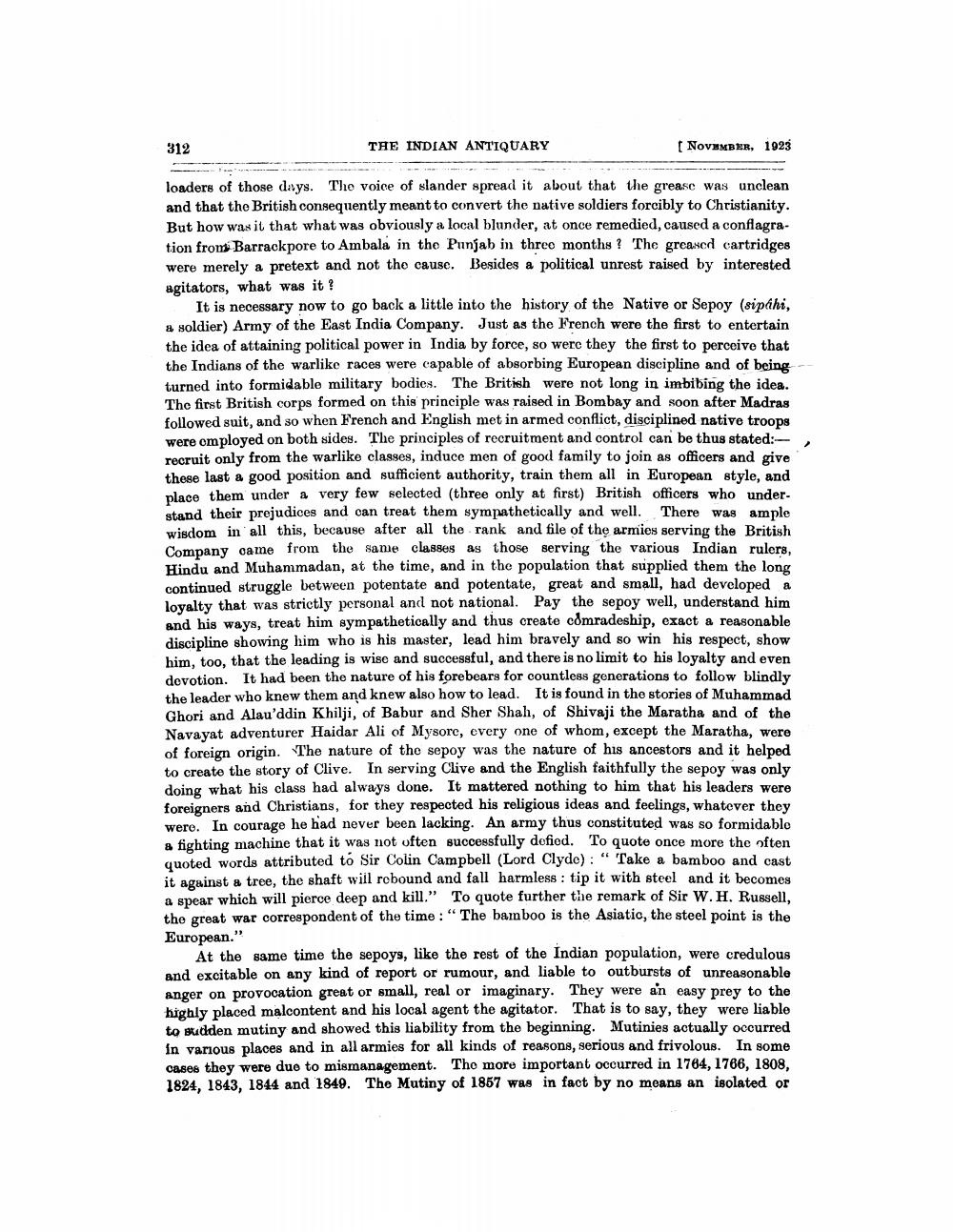________________
312
THE INDIAN ANTIQUARY
[NOVEMBER, 1923
loaders of those days. The voice of slander spread it about that the grease was unclean and that the British consequently meant to convert the native soldiers forcibly to Christianity. But how was it that what was obviously a local blunder, at once remedied, caused a conflagration from Barrackpore to Ambala in the Punjab in three months? The greased cartridges were merely a pretext and not the cause. Besides a political unrest raised by interested agitators, what was it?
It is necessary now to go back a little into the history of the Native or Sepoy (sipáhi, a soldier) Army of the East India Company. Just as the French were the first to entertain the idea of attaining political power in India by force, so were they the first to perceive that the Indians of the warlike races were capable of absorbing European discipline and of being turned into formidable military bodies. The British were not long in imbibing the idea. The first British corps formed on this principle was raised in Bombay and soon after Madras followed suit, and so when French and English met in armed conflict, disciplined native troops were employed on both sides. The principles of recruitment and control can be thus stated:recruit only from the warlike classes, induce men of good family to join as officers and give these last a good position and sufficient authority, train them all in European style, and place them under a very few selected (three only at first) British officers who understand their prejudices and can treat them sympathetically and well. There was ample wisdom in all this, because after all the rank and file of the armies serving the British Company came from the same classes as those serving the various Indian rulers, Hindu and Muhammadan, at the time, and in the population that supplied them the long continued struggle between potentate and potentate, great and small, had developed a loyalty that was strictly personal and not national. Pay the sepoy well, understand him and his ways, treat him sympathetically and thus create comradeship, exact a reasonable discipline showing him who is his master, lead him bravely and so win his respect, show him, too, that the leading is wise and successful, and there is no limit to his loyalty and even devotion. It had been the nature of his forebears for countless generations to follow blindly the leader who knew them and knew also how to lead. It is found in the stories of Muhammad Ghori and Alau'ddin Khilji, of Babur and Sher Shah, of Shivaji the Maratha and of the Navayat adventurer Haidar Ali of Mysore, every one of whom, except the Maratha, were of foreign origin. The nature of the sepoy was the nature of his ancestors and it helped to create the story of Clive. In serving Clive and the English faithfully the sepoy was only doing what his class had always done. It mattered nothing to him that his leaders were foreigners and Christians, for they respected his religious ideas and feelings, whatever they were. In courage he had never been lacking. An army thus constituted was so formidable a fighting machine that it was not often successfully defied. To quote once more the often quoted words attributed to Sir Colin Campbell (Lord Clyde): "Take a bamboo and cast it against a tree, the shaft will rebound and fall harmless: tip it with steel and it becomes a spear which will pierce deep and kill." To quote further the remark of Sir W. H. Russell, the great war correspondent of the time: "The bamboo is the Asiatic, the steel point is the European."
At the same time the sepoys, like the rest of the Indian population, were credulous and excitable on any kind of report or rumour, and liable to outbursts of unreasonable anger on provocation great or small, real or imaginary. They were an easy prey to the highly placed malcontent and his local agent the agitator. That is to say, they were liable to sudden mutiny and showed this liability from the beginning. Mutinies actually occurred in various places and in all armies for all kinds of reasons, serious and frivolous. In some cases they were due to mismanagement. The more important occurred in 1764, 1766, 1808, 1824, 1843, 1844 and 1849. The Mutiny of 1857 was in fact by no means an isolated or




